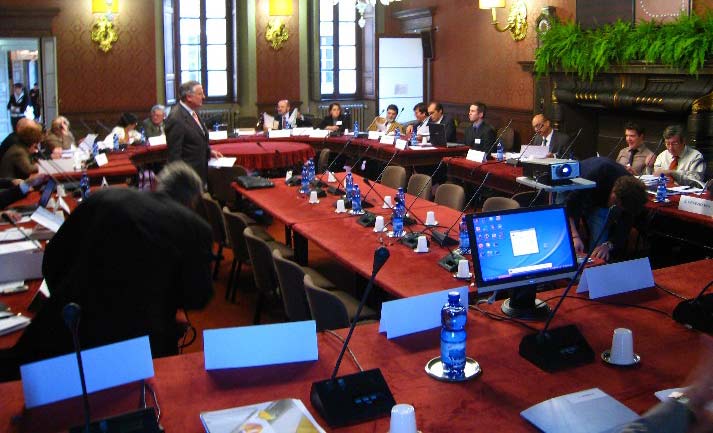ISTC Executive Director, Adriaan van der Meer gave a speech at a workshop on "Global Weapons of Mass Destruction Knowledge Proliferation Prevention and Human Engagement Programs Worldwide" at Lake Como, Italy, on 24-25 October

Introductory Remarks
by
Adriaan van der Meer,
International Science and Technology Centre, Moscow
at the IWG –LNCV Workshop and Round Table on
Global WMD Knowledge Proliferation Prevention and Human Engagement Programs Worldwide
Como, Italy – 24-25 October 2008

round table meeting in the town hall of Como, Italy
Introduction
It gives me great pleasure to attend this international workshop and round table hosted by the Landau Network Centro Volta International Working Group. The issues addressed here are topical as we face changes and new challenges in international non-proliferation. It is true that after years of common efforts by the international community a relatively complete international non-proliferation regime has been put into place. It is also true that much work remains to be done in order to adapt to new realities.
Challenges
The challenges we are facing do not only relate to the rapid spread of scientific knowledge but also to the rising number of actors involved and the relationships between them. Therefore, the key questions today are:
- How do we best prevent untrustworthy or unreliable people from gaining access to WMD;
- How do we best prevent them using that capability should they nevertheless have acquired it;
- How do we best prepare to mitigate the impact of those weapons if they were to be used;
- How do we persuade such actors not to seek to obtain WMD in the first place?
Progress in answering these questions would be inconceivable without cooperation by the international community. The composition of the workshop and round table participants reflects this fact.
Policy Effectiveness
The workshop is also timely because we are at the eve of a new G-8 Presidency, of important conferences to update existing treaties and agreements, and of the development of new or revised strategies by major players such as the United States of America and the European Union. Priorities and funding decisions will be affected by these new strategies.
A wide range of instruments are available to prevent, to control, to eliminate or to respond to the proliferation of WMD. As the EU has acknowledged in its Non-Proliferation Strategy, while all are necessary, none is sufficient in itself. There is a need to strengthen them across the board and to deploy those that are most effective in each case. In particular, I think that more attention should be paid by policy makers to actions that prevent proliferation, such as strengthening a “culture of responsibility” among people and institutions dealing with high risk and sensitive materials. I am convinced that this would be more positive and cost effective than other measures relating to the non-proliferation policy chain. I am pleased that today’s workshop will examine these questions.
Culture of Responsibility
All of us present here know that dealing with high risk materials and technologies, including know-how, have the potential for inappropriate and unauthorized use which could result in great harm. Measures to foster a non-proliferation culture are therefore crucial. At the level of individual institutes, in most countries standards of oversight, including peer reviews, are in place for individuals working in the fields of science and technology. However, the effects of globalization, such as increased mobility of scientists, raise doubts about the effectiveness of such standards on a worldwide level. At the international level, few programs exist to ensure that institutes cultivate such a “culture of responsibility”. The International Science and Technology Centers in Moscow and Kiev work to instill such a culture. Since becoming operational in the mid-1990s, they have been engaged in redirecting research to civilian purposes. They have promoted greater responsibility and raised awareness of non-proliferation norms among scientists from the former Soviet Union by integrating them into the world scientific community. In today’s world, with easier access to know-how, a drastic rise in the establishment of new research facilities, and a greater emphasis on high risk research, these aspects of the work of the ISTC and CSTU have become even more relevant.
The Role of the Scientific Centers
The Centers are non- and counter-proliferation mechanisms. They prevent individuals and non-state actors from conducting activities related to proliferation and use of WMD. They contribute to the implementation of the G-8 Global Partnership Program and the UN SCR 1540 on Global Non-Proliferation and Counter-Terrorism. The work of ISTC has helped the implementation of Russian Federation policies in the nuclear and non-nuclear energy fields as well as in the fields of health and environment. As a result of our efforts, new job opportunities and products have been created. ISTC has made Russian science available to CERN for the exiting Large Hadron Collider project.
Our working methods have evolved during the years and now put greater emphasis on international scientific cooperation, commercialization of research, and building up the capacity of institutes. The Center is becoming increasingly involved in issues related to bio-security and a new targeted initiative to counter bio-terrorism is under preparation. Moreover, the current nuclear renaissance gives rise to new issues.
Looking Towards the Future
The organizers of today’s workshop have rightly raised the issue that initiatives should be taken to better adapt existing tools and methods to the current state of affairs in the field of knowledge non-proliferation. ISTC has started a discussion taking these new realities into account. It would like to see a true partnership role for Russia and other countries.
Proposals will be discussed at the next Board Meeting in December relating to its working methods and financial arrangements. These proposals relate to:
- the implementation of a programmatic approach so that ISTC is in a better position to contribute to the solution of a number of global problems, such as climate change, renewable energy, and new nuclear technologies;
- obligatory co-financing of programs by the Russian Federation and Kazakhstan; and
- the strengthening of its match-making role between the private sector and scientific and technological institutes. This should also allow for greater involvement by Russian private entities in the work of ISTC.
ISTC also seeks the adoption of a new strategic vision, which would not only emphasize its reinforced role in preventing proliferation, but would also promote the sustainability of various institutes in Russia and elsewhere.
ISTC is willing to make its accumulated know-how available to other regions in the world. This will allow for new avenues of collaboration and human engagement in non-proliferation matters

